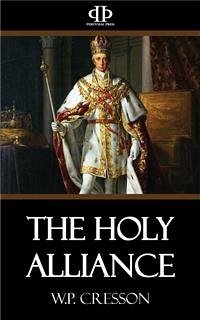The Holy Alliance by W.P. Cresson is a fascinating exploration of one of the most significant but often overlooked diplomatic coalitions of the 19th century. Published by Perennial Press, this meticulously researched work examines the formation and influence of the Holy Alliance, the post-Napoleonic pact between Russia, Austria, and Prussia that sought to preserve monarchical power and suppress revolutionary movements across Europe. Cresson masterfully unravels the motives behind the alliance and its far-reaching impact on international relations.
At the heart of the book is Tsar Alexander I, the visionary yet enigmatic leader who championed the Holy Alliance as a means to maintain European stability through a shared Christian ethos. Cresson traces the alliance’s role in shaping the balance of power, its suppression of nationalist uprisings, and its unintended consequences in fueling tensions that would later define European history. Beyond its European significance, The Holy Alliance also explores its direct connection to the Monroe Doctrine, revealing how its principles influenced U.S. foreign policy and the Western Hemisphere’s stance against European intervention.
Blending diplomatic history with sharp analysis, The Holy Alliance is an essential read for anyone interested in 19th-century European politics, the complexities of international diplomacy, and the ideological battles that shaped the modern world. W.P. Cresson’s detailed and engaging narrative offers a compelling look at an alliance that sought to control history but ultimately helped reshape it.
At the heart of the book is Tsar Alexander I, the visionary yet enigmatic leader who championed the Holy Alliance as a means to maintain European stability through a shared Christian ethos. Cresson traces the alliance’s role in shaping the balance of power, its suppression of nationalist uprisings, and its unintended consequences in fueling tensions that would later define European history. Beyond its European significance, The Holy Alliance also explores its direct connection to the Monroe Doctrine, revealing how its principles influenced U.S. foreign policy and the Western Hemisphere’s stance against European intervention.
Blending diplomatic history with sharp analysis, The Holy Alliance is an essential read for anyone interested in 19th-century European politics, the complexities of international diplomacy, and the ideological battles that shaped the modern world. W.P. Cresson’s detailed and engaging narrative offers a compelling look at an alliance that sought to control history but ultimately helped reshape it.


